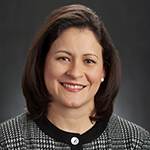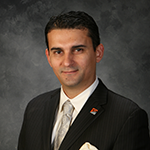Jackie Menendez had been saying the same thing for days. She had said it in Spanish and in English, into microphones and TV cameras. She had been operating out of the Miami-Dade County Emergency Operations Center for weeks. She suddenly had an endless stream of houseguests demanding answers to the same question: “How are you going to fix this mess?”
In 1992 when Hurricane Andrew tore through Miami as the strongest hurricane in more than two decades, the world turned its attention to the coastal Florida city, and it was Menendez’s job as public information officer for Miami-Dade County to keep them informed. In a 10 x 15-foot room packed with hundreds of reporters from around the globe, she gave sound bite after sound bite like a machine. Without the help of cell phones or even landlines, Menendez was tasked with the most basic, yet arguably most difficult, undertaking in the aftermath: communication. Lucky for her, and the county of Miami-Dade, that’s Menendez’s specialty.
Before she was giving quotes to ABC Evening News, Menendez had still been in front of the camera, but as a reporter for Channel 23 in Miami. An internship with the station turned into a job, and by the time she was 21 years old, Menendez was on the air. She proved to be a natural; in just a handful of years she won an Emmy for a series she reported on the subject of the clandestine training and fighting of pit bulls.
Menendez fell into the business because she had something to say and said it well. Like many of her neighbors in Miami, she came from a Cuban family that knew how a revolution could tear a family apart. Menendez’s mother was pregnant with Jackie when her father was jailed after the Bay of Pigs invasion. And it wasn’t until she was two years old that Menendez met him. She grew up very close to her cousin Alicia, whose father was also detained. In 1969, the year the US put the first man on the moon, Menendez’s uncle sent Alicia a drawing of an astronaut with her face. So touched was Menendez that she decided to write about it for the school newspaper. “I was hooked for life,” she says, recalling how that article determined her professional path. “I knew I could tell stories and express myself in a way people appreciated. That was the beginning of my journey.”
There was no shortage of stories to tell in Miami while Menendez served with Miami-Dade County. After Hurricane Andrew, Menendez played hostess to President Bill Clinton and the Summit of the Americas. She recalls standing on the tarmac at Miami International Airport with six planes taxiing simultaneously, each carrying a head of state. “I said to myself, ‘This is a cool job,’” Menendez says. “The PIO position made me realize my potential. Before then, I hadn’t been challenged at that level, but once I was forced to be nimble, I found that I could push my limits a bit more. And I liked it.”
Menendez’s handling of the hurricane caught the attention of the county manager, who offered her the opportunity to work in the county manager’s office. Keep in mind, Menendez didn’t exactly cut her teeth in management or economics or business, the subjects you’d expect from a civic leader. She had majored in broadcast journalism. “To me, city managers were all engineers, accountants, or CPAs, but in reality they’re not,” Menendez says. “It all depends on your trajectory.”
It was completely out of her comfort zone—“a lunge, a risk,” as she calls it—so naturally Menendez said yes. In the manager’s office, she was primarily responsible for the county’s public safety and communications functions. She became fascinated with regional government and the logistics of municipal management. The experience served her well because when the next opportunity presented itself—this time a village manager’s position in her community, Key Biscayne—she was prepared for the challenge.
For the next five years, Menendez managed the barrier island—and faced a few more hurricanes. Then she got a call from an old friend from her days with Miami-Dade. He said the University of Miami (UM) was looking for a vice president in communications. “I came over,” Menendez says, “met the president, and—forget it, there was no way I could walk away from the chance to work for my alma mater.”
When she arrived at the university, “The U,” as it has come to be called, was not known as such because the iconic green-and-orange split “U” emblem was still exclusive. Only the athletic program used it, and it was one among “an inventory of branding identities that would make your head spin,” says Menendez. Charged with settling on just one, Menendez set to work communicating the identity of more than just the school, but its network of alumni, fans, and supporters around the world, and presence in the city of Miami, through a single image. Though the split “U” already had a strong following among sports fans of the university, Menendez had to consider the blowback from those not so enamored by the school’s athletics. After two years of researching impressions on faculty, alumni, prospective students—and their parents—the decision was made.
“I’m not going to say it’s as famous as the Nike swoosh,” Menendez says of the split “U,” “but we are certainly on our way.” Menendez had no idea how successful the campaign would be when the emblem launched, but when she sees it on her trips abroad, and former-college-athletes-turned-pro throw it up at NFL games, she gets a good indication.
One reason Menendez was drawn to the university was the impressive Momentum fundraising campaign that had generated $1.4 billion for the school. Working for the senior vice president of advancement and external affairs Sergio M. Gonzalez, who had recruited her to UM, Menendez has been involved in another billion-dollar campaign. With a goal of $1.6 billion to fund scholarships, infrastructure, programming, and faculty, Momentum2, The Breakthrough Campaign for the University of Miami as its tagline describes, is already surpassing goals set for its end date in 2016, with more than $1 billion already raised. As in her previous endeavors, Menendez credits the foundation in communication she received as an undergrad at the school for which she now works. “I never considered higher education in any of my plans,” she says, still in awe of the path her life has taken. “I was a reporter. I left here thinking I would spend my entire professional career in TV.”
Sometimes the opportunities least expected are the most rewarding. Since she stood in the shadow of the jets at Miami International Airport and watched dignitaries from around the world descend on Miami, Menendez has been able to take pause in each position she’s held and come to the same conclusion: this is a cool job. “It’s not just about testing my limits,” Menendez says. “It’s about appreciating the path my career has taken.”

